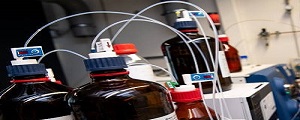Histopathology Service
Histopathology is a subspecialty of Pathology that focuses on the microscopic study of tissue samples in
order to diagnose diseases and understand their underlying causes..
- Tissue Fixation and Processing
- Histological Staining
- Immunohistochemistry (IHC)
- Molecular Histopathology
- Forensic Pathology Services
- Research Histopathology
Tissue Fixation and Processing
Tissue samples are preserved in formalin or similar fixative after collection in order to stop cellular
deterioration.To get ready for microscopic inspection, the preserved tissues are dried, embedded in
paraffin, and cut into tiny slice.
Histological Staining
Staining is widely used in histopathology and diagnosis, as it allows for the identification of
abnormalities in cell count and structure under the microscope.Stains used are Haematoxylin and
eosin,Van Gieson,Picric acid,Toluidine blue,Alcian blue,Giemsa,Reticulin,
Nissl
l,
Orcein,Sudan black B,
Masson’s trichrome,Mallory’s trichrome,Azan trichrome,Cason’s trichrome,PAS (Periodic acid
Schiff),Weigert's resorcin fuchsin (Weigert’s elastic),
Giemsa stain,
Aldehyde fuchs
Immunohistochemistry (IHC)
IHC staining identifies cancer, specific proteins or markers on cells and tissues, making it critical
for diagnosing cancer, infectious diseases, autoimmune disorders, and rare diseases..
Molecular Histopathology
Molecular Histopathology is a specialized field of pathology that combines traditional histopathology
techniques with advanced molecular biology tools to study the genetic and molecular changes associated
with diseases.
Genetic Testing
Fluorescence In Situ Hybridization (FISH)
Next-Generation Sequencing (NGS).
Forensic Pathology Services
Tissue samples are examined in forensic histopathology autopsies to ascertain the cause of death,
particularly in cases involving suspected foul play, accidents, or inexplicable fatalities. In cases of
overdose or poisoning, tissue samples can be examined for the presence of drugs, poisons, or other
chemicals.
CONTACT
:
Email:
allelelifesciences
@gmail
.com or
Whatsapp
+91- 8377082003





